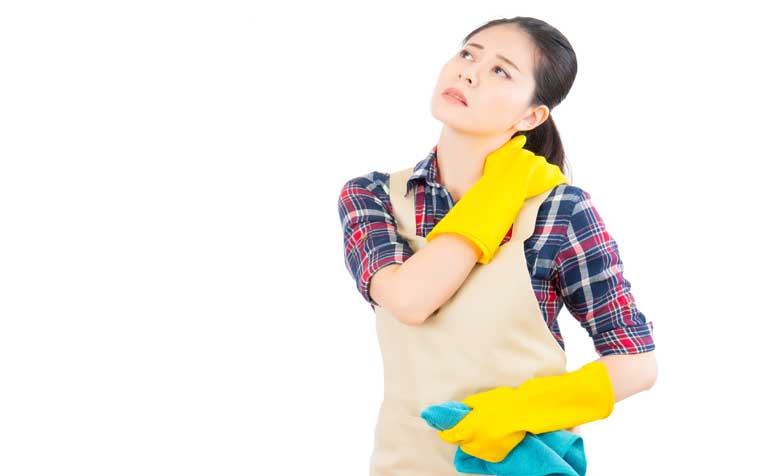
Repetitive strain injury is not just a workplace woe, it is also experienced by those who regularly do housework.
How does housework contribute to Repetitive Strain Injury (RSI)?
Repetitive strain or stress injury (RSI) is often associated with computers and other technological devices. But it is less well known that RSI is a common problem for those who regularly do housework. Indeed, a study done by Singapore General Hospital (SGH) occupational therapists in 2012 found that one of the biggest groups of patients with upper limb RSI were women in their 50s.
The most common problem was trigger finger where one of the fingers gets stuck in a bent position. “There was no data collected on what is the most common repetitive movement for this group, but some common tasks that can contribute to RSI include washing clothes by hand, using an awkward wrist posture when hanging clothes on bamboo poles, wringing mops, carrying heavy groceries, and carrying children,” said Ms Yang Zixian, Principal Occupational Therapist, from Occupational Therapy Department at Singapore General Hospital (SGH), a member of the SingHealth group.
What is Repetitive Strain Injury (RSI)?
RSI is an umbrella term covering a range of disorders affecting muscles, nerves and tendons. Caused by repeated movements as well as awkward grips and postures, RSI tends to affect the upper body, specifically the elbows, wrists, hands, neck and shoulders. It is usually brought on by daily activities such as cleaning windows, hanging out poles heavy with wet clothes, carrying heavy bags of groceries, ironing, and mopping floors, said Associate Professor Denny Lie, Senior Consultant, Department of Orthopaedic Surgery, Singapore General Hospital, a member of the SingHealth group.
What are the symptoms of Repetitive Strain Injury (RSI)?
In most cases, symptoms develop gradually. So patients might first notice some muscle tightness, stiffness or pain in the neck and shoulder areas. Head and neck movements then become limited. Or a deep ache starts to develop, but goes away when given time to rest – if not, the inflammation can worsen. “It’s an accumulation of micro traumas sustained by the tendons. As patients persist in the same activity, the inflammation and injuries do not heal. Such tendons are thus more prone to further injuries and tears,” said Prof Lie. “Sometimes, a tendon can rupture, and cause a sharp pain. If inflamed tendons begin pinching on nerves nearby, patients may also experience numbness and tingling sensations,” Prof Lie added.
How can Repetitive Strain Injury (RSI) be prevented?
The best way to manage RSI is by prevention, early treatment, physiotherapy and occupational therapy. Steroid injections to the tendon to reduce inflammation or platelet-rich plasma injections may also be required.
How to prevent Repetitive Strain Injury (RSI):
Not all is lost for those who scrub and clean from dawn to dusk. Tips to keep RSI at bay include:
- Stop the work if a joint is painful. Take a break, or do other housework to prevent repeated and continuous strain on the tendons.
- Stand on a stool to avoid keeping arms raised for long periods when cleaning a tall cupboard, or adjust the height of the ironing board to reduce neck strain.
- Do regular stretches during rest breaks, especially for the back, legs and arms.
- Pay attention to posture and ergonomics. When vacuuming, maintain an upright position and move backwards and forwards, instead of standing still and bending and pushing the vacuum cleaner. When washing dishes, place one foot on a stool to avoid arching the back, and keep wrists flat and straight.
- Maintain a reasonable level of fitness.
- Seek early treatment when in pain. Self-medication with ointments can be useful but if pain persists, seek medical help early.
A few minor adjustments can help prevent RSI when doing housework:


↑ Opt for an overhead clothesline for hanging wet laundry to avoid over-extending shoulder and neck muscles.

↑ Invest in a spin-type mop to minimise wrist injuries from wringing.

↑ Use a rubber pad for a firm grid when opening tight jar lids.
Ref: O17
Contributed by














 Get it on Google Play
Get it on Google Play